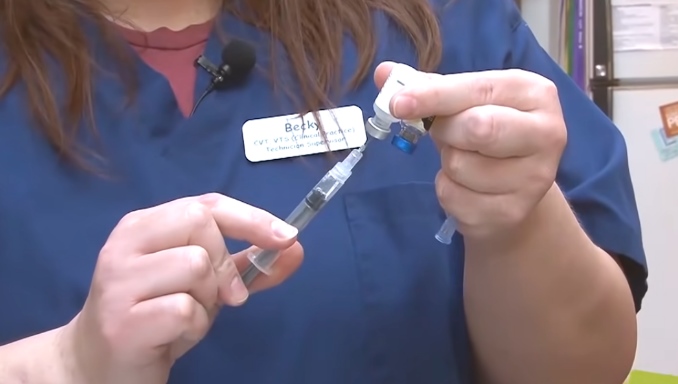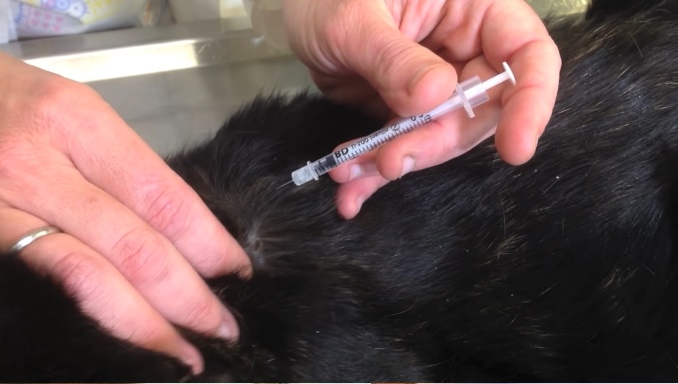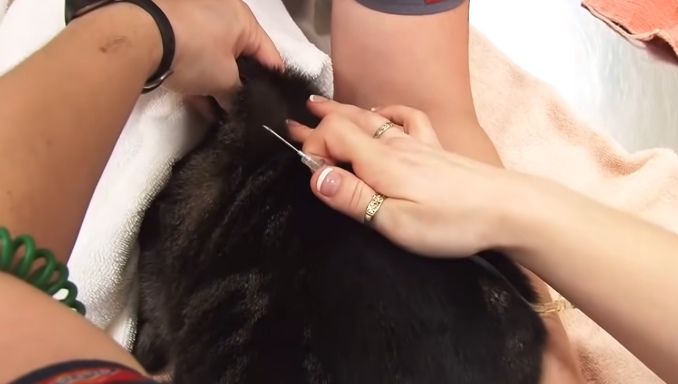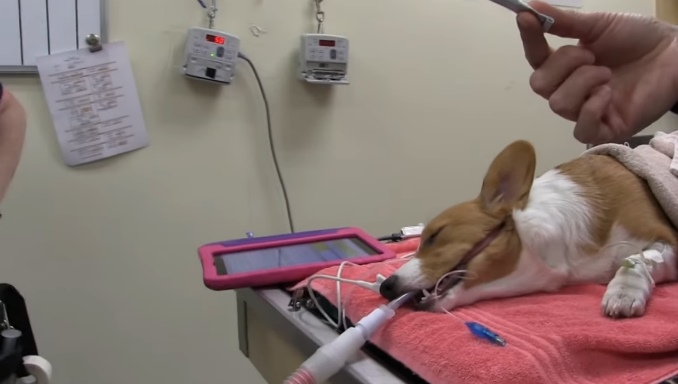What Shots Do Puppies Need?
When you get a new puppy, one of the first things you need to do is take them to the vet for their shots. Shots are important because they help protect your puppy against harmful diseases. There are a number of different shots puppies need, so it’s important to know which ones your pup needs and when to get them.
What shots do puppies need? This blog post will discuss the different shots puppies need and when they should be given. It will also provide some tips on how to make taking your puppy for their shots easier. So if you’re new to dog ownership or just want to learn more about puppy vaccinations, keep reading!

What Are The Different Types Of Puppy Shots?
There are a number of different types of puppy shots, but the most common are the distemper, hepatitis, parvovirus, and rabies vaccinations. These vaccinations are important in protecting puppies from deadly diseases.
What Shots Do Puppies Need?
There are a number of different shots puppies need, which can vary depending on where you live. In general, however, most puppies need to receive the following vaccinations:
Distemper
A highly contagious disease that can affect a puppy’s respiratory, gastrointestinal, and nervous systems.
All puppies need a series of vaccinations to protect them from distemper. The initial dose is usually given at 6-8 weeks of age, with follow-up shots every 3-4 weeks until the puppy is 16 weeks old. After that, they’ll need an annual booster shot to keep them protected.
Vaccine Cost: $30
Hepatitis
What Shots Do Puppies Need include hepatitis? Canine hepatitis is a viral infection that affects a dog’s liver. It is a serious disease that can be deadly, so it’s important to make sure your puppy is vaccinated against it.
Canine hepatitis usually affects young dogs, with the majority of cases occurring in dogs under one year of age. The disease is characterised by a sudden onset of fever, lethargy, anorexia, and vomiting. In severe cases, it can lead to liver failure and death.
There is no specific treatment for canine hepatitis, so vaccination is the best way to protect your dog from this disease.
Puppies should receive their first dose of the hepatitis vaccine at 6-8 weeks of age, with follow-up shots every 3-4 weeks until they are 16 weeks old. After that, they’ll need an annual booster shot to keep them protected.
Vaccine Cost: $60 – $120
Leptospirosis
What is: Leptospirosis is a bacterial infection that can affect a dog’s kidneys and liver. It is a serious disease that can be deadly, so it’s important to make sure your puppy is vaccinated against it.
Leptospirosis is most commonly spread through the urine of infected animals, which can contaminate food, water, or soil. The disease can also be spread through contact with infected animals, so it’s important to keep your puppy away from sick or wild animals.
Puppies should receive their first dose of the leptospirosis vaccine at 12 weeks of age, with a booster shot given every 3-4 weeks until they are 16 weeks old. After that, they’ll need an annual booster shot to keep them protected.
Vaccine Cost: $20 – $30
Heartworm
Do What Shots Do Puppies Need include heart worm? Heartworm is a parasitic infection that is spread by mosquitoes. It can be fatal to dogs if left untreated, and can also cause serious health problems.
Heartworm infection can cause a variety of symptoms in dogs, including coughing, exercise intolerance, and weight loss. In severe cases, heartworms can cause heart failure and death.
The hepatitis vaccine should be given to puppies at 12-to-16 weeks of age, and then booster shots should be given every 3-to 4 weeks until the puppy is 16 weeks old. After that, annual booster shots are recommended.
The best way to prevent heartworm disease is to use a monthly preventive medication. There are a variety of products available, so talk to your veterinarian about which one is best for your dog.
Vaccine Cost: $50 – $100
Parainfluenza
Parainfluenza is a virus that causes respiratory infections in dogs. It is a highly contagious disease that can be deadly, so it’s important to make sure your puppy is vaccinated against it.
Puppies should receive their first dose of the Parainfluenza vaccine at 6-8 weeks of age, with follow-up shots every 3-4 weeks until they are 16 weeks old. After that, they’ll need an annual booster shot to keep them protected.
The best way to prevent your puppy from getting sick is to keep them up-to-date on their vaccinations. Puppies need a series of shots to build up their immunity, so it’s important to follow the vaccination schedule recommended by your veterinarian.
Vaccine Cost: $50 – $100
Kennel cough
Kennel cough is a highly contagious respiratory infection that can affect dogs of all ages. It is caused by a variety of bacteria and viruses, and can be deadly if left untreated.
The best way to prevent kennel cough is to make sure your dog is vaccinated against it. Puppies should receive their first dose of the vaccine at 6-8 weeks of age, with follow-up shots given every 3-4 weeks until they are 16 weeks old. After that, they’ll need an annual booster shot to keep them protected.
There is no specific treatment for kennel cough, so the best way to prevent it is to vaccinate your dog and avoid places where there are sick dogs.
Vaccine Cost: $20 – $40
Parvovirus
Parvovirus is a highly contagious virus that can be deadly to dogs. It is most commonly spread through contact with infected feces, so it’s important to keep your puppy away from places where other dogs have been.
Puppies should receive their first dose of the parvovirus vaccine at 6, 8 to 12 weeks of age, with follow-up shots given every 3-4 weeks until they are 16 weeks old. After that, they’ll need an annual booster shot to keep them protected.
There is no specific treatment for parvovirus, so the best way to prevent it is to vaccinate your dog and avoid places where there are sick dogs.
Vaccine Cost: $20 – $40
Coronavirus
When to come What Shots Do Puppies Need, do they need Coronavirus.
As the novel coronavirus continues to spread across the globe, many people are wondering whether their pets are at risk of contracting the disease. Canine coronaviruses are common and usually cause only mild gastrointestinal illness in dogs, but some strains can cause more serious respiratory disease.
-Fever
-Coughing
-Sneezing
-Body Aches
There is no specific age or weight requirement, but most puppies will need to be at least six weeks old before they can receive their first set of shots. Some may even need to be a bit older, depending on their size and health. If you’re unsure about when your puppy should start getting vaccinated, talk to your veterinarian.
Vaccine Cost: $20-$40
Bordetella Bronchiseptica
Bordetella Bronchiseptica is a highly contagious respiratory disease that affects both dogs and cats. It is most commonly spread through close contact with infected animals, such as during grooming or play. Puppies and kittens are especially susceptible to the disease, as their immune systems are not yet fully developed. Symptoms of Bordetella include a harsh, dry cough, runny nose, and fever. If left untreated, the disease can lead to pneumonia and even death.
To protect your pet from Bordetella, most veterinarians recommend a series of vaccinations starting at around six weeks of age. Puppies will typically need two or three booster shots over the course of several months to build up full immunity. After that, they will need an annual booster to stay protected. If your pet is at high risk for exposure to Bordetella (such as if they go to dog parks or boarding facilities), your veterinarian may recommend more frequent boosters.
There are a few different vaccines available for Bordetella, so talk to your veterinarian about which one is right for your pet. Some are given as a single shot, while others are given in a series of shots. There is also a nasal spray vaccine available, which can be particularly useful for dogs who don’t like needles! No matter which vaccine you choose, it’s important to follow your veterinarian’s recommendations to help keep your pup healthy and protected.
Vaccine Cost: $10 – $50
Rabies
Rabies is a deadly disease that affects the nervous system of warm-blooded animals, including humans. It is caused by a virus that attacks the brain and spinal cord. The virus is usually spread through the bite of an infected animal, but it can also be spread through contact with saliva or other body fluids from an infected animal. Rabies is almost always fatal once symptoms develop, but it can be prevented with prompt treatment.
Puppies need to be vaccinated against rabies as soon as they are old enough. The first vaccine is usually given at 12 weeks of age, and a booster shot is given one year later. Puppies should then be vaccinated every three years for the rest of their lives.
Talk to your veterinarian about which vaccinations are right for your puppy, and make sure to keep up with the recommended booster shots. Vaccinating your puppy will help protect them from deadly diseases and keep them healthy for years to come.
Vaccine cost: $15 – $20
Lyme Disease
Lyme disease is an infection that is caused by a bacteria called Borrelia burgdorferi. This bacteria is transmitted to humans and animals through the bite of an infected tick. Lyme disease can cause a wide range of symptoms, including fever, rash, joint pain, and fatigue. If left untreated, Lyme disease can lead to serious health problems, including neurological disorders and heart problems. Lyme disease is a serious condition that requires prompt treatment with antibiotics.
A bacterial infection that can cause fever, joint pain, and neurological problems. Puppies should start receiving the Lyme disease vaccine at 8 weeks of age and booster shots every 3-4 weeks until they are 16 weeks old.
Vaccine cost: $20 – $40
Now you know What Shots Do Puppies Need, read on for more information.
Where Should I Go To Vaccinate My Dog?
The best place to vaccinate your dog is at the vet. Your vet will be able to administer the proper vaccinations and will also have a record of your dog’s vaccination history. This is important in case your dog ever needs to see a specialist or have any health problems in the future. If you are not able to take your dog to the vet, there are some pet stores that offer vaccinations. However, it is always best to consult with your vet first before vaccinating your dog yourself.
At What Age Does Puppies Get Shots?
Puppies need to start getting shots when they are about 6-8 weeks old. They will then need to get booster shots every 3-4 weeks until they are around 16 weeks old. After that, puppies will need to get shots every year to stay up-to-date on their vaccinations.
What Is The Schedule For Puppy Shots?
The schedule for puppy shots will vary depending on the specific vaccinations, but most puppies will need to start getting shots when they are 6-8 weeks old. They will then need booster shots every 3-4 weeks until they are around 16 weeks old. After that, puppies will need to get shots every year to stay up-to-date on their vaccinations.

How to Make Taking Your Puppy for Their Shots Easier
Now you know What Shots Do Puppies Need, maybe you need to know how to give them the shots. Taking your puppy for their shots can be daunting, but there are a few things you can do to make the experience easier. First, make sure you choose a vet that you feel comfortable with and that has experience with puppies. It’s also a good idea to ask for a tour of the facility before your pup’s appointment so you know what to expect. Finally, bring along a toy or treat to help keep your puppy calm during the appointment.
We hope this blog post has been helpful in understanding the different shots puppies need and when they should be given them. If you have any questions, please feel free to contact us. And remember, if you’re ever in doubt about your puppy’s health, always consult with a veterinarian.
10 Tips to make taking your puppy for their shots easier:
1. Choose a vet that you are comfortable with and that has experience with puppies.
2. Ask for a tour of the facility before your pup’s appointment so you know what to expect.
3. Bring along a toy or treat to help keep your puppy calm during the appointment.
4. Be sure to ask any questions you have about the vaccinations.
5. Make sure you know how to properly care for your puppy’s injection site.
6. Keep an eye on your puppy for any signs of discomfort or illness after their shots.
7. Be sure to keep up with the recommended booster shots.
8. Contact your vet immediately if you have any concerns about your puppy’s health.
9. Remember that prompt treatment is important if your puppy contracts a disease.
10. Vaccinating your puppy will help protect them from deadly diseases and keep them healthy for years to come.
What Dog Vaccines Are Required?
While there is no law requiring dog vaccinations, most veterinarians and animal shelters require proof of vaccination before providing services or adopting out animals. The vaccines most commonly required for dogs are rabies, distemper, and hepatitis. Some areas may also require vaccination against Bordetella, parvovirus, and Lyme disease.
What Shots Do Puppies Need? Are they required? Let’s take a closer look now.
Rabies is a fatal disease that affects the nervous system and is transmitted through saliva, usually via a bite. All dogs should be vaccinated against rabies. Distemper is a contagious and often fatal disease that affects the respiratory, gastrointestinal, and nervous systems. It is spread through contact with infected bodily fluids or contaminated surfaces. Hepatitis is a viral disease that affects the liver and can be transmitted through contact with infected bodily fluids or contaminated surfaces.
Bordetella is a bacterial disease that causes respiratory infections, such as kennel cough. It is spread through contact with infected dogs or contaminated surfaces. Parvovirus is a viral disease that primarily affects young puppies and can cause severe gastrointestinal illness. It is spread through contact with infected bodily fluids or contaminated surfaces. Lyme disease is a bacterial disease that is transmitted through the bite of an infected tick. It can cause a variety of symptoms, including fever, joint pain, and lameness.
Most dog vaccines are given in a series of two or three shots given two to four weeks apart. Puppies should start their vaccinations at six to eight weeks of age and booster shots are typically given every one to three years thereafter. Adult dogs that have not been vaccinated or have only received a limited number of vaccines may need a booster shot more often. Discuss your dog’s vaccination needs with your veterinarian.

Possible Reactions After Vaccinating Dogs
After vaccinating your dog, it is normal to see some side effects. The most common reaction is a mild fever that lasts for two or three days. Other possible reactions include:
-Soreness, redness or swelling at the injection site
-Lethargy
-Loss of appetite
-Diarrhea
-Vomiting
In rare cases, more serious reactions can occur. If you notice any of the following after vaccinating your dog, please contact your veterinarian immediately:
-Difficulty breathing
-Hives or swelling of the face, muzzle or lips
-Collapse or weakness
-Seizures
-Behavior changes (e.g., aggression, restlessness or depression)
What should I do?
If your dog experiences any of the above reactions, please contact your veterinarian. They will be able to advise you on the best course of action. Sometimes, they may recommend giving your dog a short course of steroids to reduce the reaction. In rare cases, hospitalization may be necessary. However, most reactions are mild and will resolve on their own within a few days.
After the question What Shots Do Puppies Need, possible risk are need to consider, and now you have it!
What Are The Risks Of Not Getting Your Puppy Vaccinated?
There are a number of risks associated with not getting your puppy vaccinated. The most serious of these is the risk of contracting a deadly disease. Diseases such as parvovirus, distemper, and hepatitis can kill a puppy within days, even with treatment. Without vaccination, puppies are also at risk for more common but still dangerous diseases such as kennel cough and rabies.
In addition, unvaccinated puppies may be more likely to contract other infections and illnesses, such as Giardia, because their immune systems are not yet fully developed. Finally, if your puppy is not vaccinated and comes into contact with another dog that is carrying a disease, he or she can easily spread it to other dogs, putting them at risk as well. Vaccination is the best way to protect your puppy from these risks and ensure a long and healthy life.
Symptoms of the above diseases
1. Parvovirus: This is a deadly disease that can kill a puppy within days, even with treatment. Symptoms include severe diarrhea, vomiting, lethargy, and dehydration.
2. Distemper: This is another deadly disease that affects a puppy’s respiratory, gastrointestinal, and nervous systems. Symptoms include fever, coughing, sneezing, runny eyes and nose, vomiting, diarrhea, seizures, and paralysis.
3. Hepatitis: This disease affects a puppy’s liver and can be deadly. Symptoms include fever, jaundice (yellowing of the skin), lethargy, loss of appetite, and vomiting.
4. Kennel Cough: This is a common respiratory infection that can be deadly in young puppies. Symptoms include a harsh, hacking cough that sounds like a honking goose.
5. Rabies: This is a deadly disease that affects the nervous system and is transmitted through saliva. Symptoms include fever, lethargy, loss of appetite, paralysis, seizures, and death.
6. Giardia: This is a common intestinal infection that can cause diarrhea, vomiting, and weight loss. Symptoms include watery, foul-smelling diarrhea that may or may not contain blood.
7. Lyme Disease: This is a bacterial infection that is transmitted through tick bites. Symptoms include fever, lethargy, loss of appetite, joint pain, and lameness.
8. Ringworm: This is a fungal infection that affects the skin and nails. Symptoms include a rash or lesion that is red, itchy, and scaly.
9. Coccidia: This is a protozoan infection that affects the intestines and can cause severe diarrhea. Symptoms include watery, foul-smelling diarrhea that may or may not contain blood.
10. Giardiasis: This is a common intestinal infection that can cause diarrhea, vomiting, and weight loss. Symptoms include watery, foul-smelling diarrhea that may or may not contain blood.
As you can see, there are a number of risks associated with not getting your puppy vaccinated. The best way to protect your puppy is to make sure he or she stays up-to-date on all vaccinations. If you have any questions about the vaccine schedule for your puppy, please consult your veterinarian.

Some Common Diseases In Dogs And Signs To Recognize Them
Knowing What Shots Do Puppies Need will help your dog avoid them, if you want to know the signs of them, here’re somethings to know.
Dogs are one of the most popular pets in the world and their popularity is only increasing. Unfortunately, as our furry friends age, they become susceptible to a number of different health problems. While some health problems are more common in certain breeds, all dogs are at risk for developing them. Here are some of the most common diseases in dogs and the signs to look out for:
Arthritis is a common condition that affects dogs as they age. Symptoms of arthritis include stiffness, lameness, pain, and decreased activity level. If you think your dog may be suffering from arthritis, make an appointment with your veterinarian. They will be able to diagnose the condition and recommend treatment options.
Cancer is another common disease in dogs. Unfortunately, cancer can be difficult to detect in its early stages. Symptoms of cancer include weight loss, lethargy, and changes in appetite or behavior. If you notice any of these signs, make an appointment with your veterinarian right away. Early detection is key to successful treatment.
Heart disease is a leading cause of death in dogs. Symptoms of heart disease include coughing, difficulty breathing, and exercise intolerance. If you think your dog may be suffering from heart disease, make an appointment with your veterinarian right away. They will be able to perform testing to diagnose the condition and recommend treatment options.
Kidney disease is a common condition that affects older dogs. Symptoms of kidney disease include increased thirst, urination, and appetite. If you think your dog may be suffering from kidney disease, make an appointment with your veterinarian right away. They will be able to perform testing to diagnose the condition and recommend treatment options.
Dental disease is one of the most common health problems in dogs. Symptoms of dental disease include bad breath, difficulty eating, and pawing at the mouth. If you think your dog may be suffering from dental disease, make an appointment with your veterinarian right away. They will be able to perform a dental cleaning and recommend treatment options.
As you can see, there are a number of different health problems that can affect dogs as they age. If you think your dog may be suffering from any of these conditions, make an appointment with your veterinarian right away. Early detection and treatment is key to maintaining your dog’s health and preventing further complications.
How To Protect Your Dog From Disease And Keep Them Healthy
There are many diseases that can affect dogs, some of which can be very serious. It is important to do everything you can to protect your dog from disease and keep them healthy.
One of the best ways to protect your dog from disease is to make sure they are up to date on their vaccinations. Vaccinations help to build immunity against many diseases, making it less likely that your dog will become sick.
Another way to protect your dog from disease is to feed them a healthy diet. A nutritious diet helps to keep the immune system strong, making it more able to fight off infection.
It is also important to keep your dog away from places where they could be exposed to diseases. This includes places where other sick animals have been, such as shelters or dog parks.
If your dog does become sick, it is important to take them to the vet right away. The sooner the disease is diagnosed, the better the chances are of successful treatment.
By taking some simple steps, you can help to protect your dog from disease and keep them healthy. vaccinate them, feed them a nutritious diet, and keep them away from places where they could be exposed to sick animals. If your dog does become sick, seek veterinary care right away. With proper care, your dog can enjoy a long and healthy life.

FAQs of What Shots Do Puppies Need
What are some common health problems in dogs?
There are many common health problems that can affect dogs. Some of these include arthritis, cancer, heart disease, kidney disease, and dental disease.
What are some ways to protect my dog from disease?
Some ways to protect your dog from disease include making sure they are up to date on their vaccinations, feeding them a healthy diet, and keeping them away from places where they could be exposed to sick animals.
When should puppies get dewormed?
Puppies should get dewormed as soon as they are born. Depending on the type of worms present, puppies may need to be re-dewormed several times during their first few months of life. It is important to follow the directions of your veterinarian when it comes to deworming schedules for your puppy.
Depending on your puppy’s health and risk factors, your vet may recommend more frequent deworming or a different type of deworming medication. In addition to regular deworming, you should also keep an eye out for potential signs of worms in your puppy, such as weight loss and diarrhea. If you notice these signs, consult with a veterinarian immediately. Keeping up with deworming and other preventative health measures can help keep your puppy healthy for years to come.
If my dog becomes sick, what should I do?
If your dog becomes sick, it is important to take them to the vet right away. The sooner the disease is diagnosed, the better the chances are of successful treatment.
How long do dog vaccines last?
The length of time that dog vaccines last depends on the vaccine. Some vaccines may provide immunity for several years, while others may only last for a few months. Your veterinarian can help you determine how often your dog needs to be vaccinated.
How much is dog vaccinations cost Philippines?
The cost of dog vaccinations in the Philippines can vary depending on the type of vaccine and the number of doses required. The average cost for a single dose of vaccine is approximately PHP 700, while the cost for a full course of vaccines can range from PHP 2,000 to PHP 4,000. Vaccination costs will also vary depending on the clinic or hospital where you receive the vaccine, as well as whether or not you have private health insurance.
The cost of dog vaccinations in the Philippines varies depending on the vaccine. Some vaccines may be free, while others may cost several hundred pesos. Your veterinarian can help you determine the cost of vaccinations for your dog.
How long can dog vaccines be out of fridge?
Most vaccines should be used within 24 hours of being removed from the fridge. If a vaccine has been out of the fridge for longer than 24 hours, it should be discarded and a new vaccine should be used. It is important to follow the manufacturer’s instructions for storage and handling of vaccines.
Conclusion
Puppies need a series of shots to protect them from diseases as they grow. It is important for pet owners to keep their puppies’ vaccinations up-to-date so that they can live healthy lives. There are several diseases that puppies are susceptible to and there are specific vaccinations available to prevent these illnesses. Pet owners should consult with their veterinarian to determine the necessary vaccines for their puppy.
Above is the article “What shots do puppies need?”. Thanks for reading!








